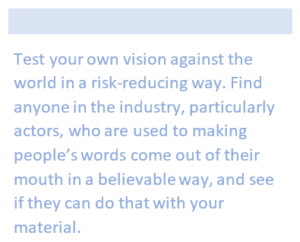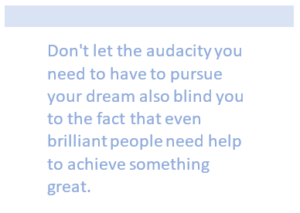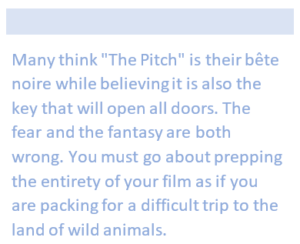Be Prepared With a Ready Script!
I Have Always Subscribed To The Boy Scout Motto: “Be Prepared.”
The purpose of this series is to discuss and study the key risks inherent in the motion picture business. By contemplating, planning for and planning against these risks at the beginning of the development process, and all the way through execution, you and your film can be better prepared at each juncture. This could be likened to reading about and supplying yourself for potential bear or cougar confrontations on a back-country trail. That kind of preparation can save your life, and the lives of those around you.
The First Key Risk in Making a Film
A Quality Script
What this particular piece is NOT about is how to write a damn good script (nod to my old friend, James Frey, author of How to Write a Damn Good Novel). I am assuming you have written a script, or acquired one that you feel is ready, or moving toward being ready to shoot. Nor is this piece for those who are just looking to sell their script off. This is for filmmakers who are pursuing their film all the way to the box office and beyond. And just so you know, if you are pursuing your film all the way through production, you better be planning to pursue it all the way to the box office and beyond.
Are You Self-Delusional or Visionary?

The self-delusion/visionary divide is the first chasm one confronts with a movie script. Are you full of it, or are you the one who can see more clearly than many or even all of those around you? To inoculate yourself against this kind of “Disaster Artist” situation, you might find the best and smartest and some of the most middle of the road people you can find and check out what their reaction is to your story and script (knowing that a script is a rare breed of writing some folks just may not “get.”). Test your own vision against the world in a risk-reducing way. Find anyone in the industry, particularly actors, who are used to making people’s words come out of their mouth in a believable way, and see if they can do that with your material. Can the lines be delivered meaningfully? Find directors and see what their take is. Ask producers how they see it. Everything is to be taken with an eye to learning more about how the vision in your head translates to others through the scenario that has been crafted, and refining that scenario until it accomplishes your vision as well as it can. Every great project needs to be tested before submission to the world. Some of the things you learn may surprise you, scare you, or cause you to confront fears, your ego, and more. If you seek out honest, sincere aides, you will be fine.
I worked on three projects in the last year that all dealt with these emotions, and which accessed services and advice which was of considerable value to the writers, and which advice and their actions upon the advice moved their projects forward very effectively. Maybe these stories might be of value to you.
- One was a script that had a strong historical story, containing content of great interest to history buffs, to faith audiences, and to lovers of intense personal dramas. Still, the script, by all accounts, needed to be tightened and re-focused so that it was more effective and authentic for the various audience constituents, not lopsided in one direction. A well-known script doctor who not only has top-notch doctoring credits, but is also a theological expert was brought in and through some lengthy and direct advice and negotiations, the project’s team saw they needed to hire her. With very pointed notes from the doctor, the writers took the advice really well and transformed the script, enabling all to become much more comfortable with its now wider audience potential, and to begin to fight harder for its success.
- The second was a domestic social story about disaffected youth. Some of its grasp of its own themes, written by a male, but depicting a lot of female emotions, was loose and skittered off into unfocused territory. The heart of the script and the story was in the right place, but the execution was not there, in the opinions of most. A script rewrite was commissioned from a fast and effective female screenwriter, who absolutely nailed all the elements and turned in a great script that was very much ready to go. The writer/producer, now co-writer/producer was able to convince a group of executives that this could be a really nice film. All that remained was for him to manage his own ego through the process.
- The third was a dark, but totally unique script that all felt very strongly would make a great indie drama that could capture attention and look at social situations in a new way. But, there were questions about many small and medium elements in the screenplay as it stood. Multiple film production and development experts weighed in with thoughts about how they saw the script and its characters and story play out, and the dedicated and determined writer took it all in, and synthesized it to turn in an even better tale that hewed very strongly to what she wanted to communicate and see, and everyone went from feeling really good about the story, to feeling extremely good about getting behind it and pushing it strongly out to market.
Now, many writers feel precious about their children, these stories they have birthed, Certainly, it requires sometimes delicate negotiations to convince some of the writers to hear what is being said, or even to get folks to go back and find the investment needed to bring in outside help, which, of course, had to be paid. But, in each of these cases, it was supremely worth the effort. The stories were stronger, the producer/writers were generally more confident of the work. But this is and was for them the place where they met the risk that resides within us all, that of discerning trustworthy advice, and negotiating with our own egos. Don’t let the audacity you need to have to pursue your dream also blind you to the fact that even brilliant people need help to achieve something great.
The Script Is Set

Once you have decided that this is the story you are going to pursue, the tests of your fortitude begin to arise again. There is a reason that the industry likes old stories and retreads. There is comfort in familiarity. And none of the films I mentioned above is an old or retreaded story. In a business where the most well-known quote is from William Goldman, who has said: “Nobody knows anything… Not one person in the entire motion picture field knows for a certainty what’s going to work,” insecurity is rampant, right? This is why folks are seeking comfort. But seeking comfort continually will only result in the kind of loss of appetite we have seen in this last year at the box office. Retreading the same old tastes and tropes can cause fatigue in audiences, which is just as bad, maybe worse than a lack of pre-awareness of your story, or the comfort in old tropes.
Believe In Yourself! You are Affronting the World with Your Audacity
Offering a script to the world is an audacious act. Their reticence for your new material is a natural reaction to the sheer volume and persistence of scripts and filmmakers seeking attention. Can you convince others of the quality of your script, so that you can enlist them in getting it made?
I remember Terry Zwigoff telling me the story years ago of how he and Robert Crumb were trying to get a first feature film off the ground together. Terry had made a great documentary, Louie Bluie (and would go on not long after to make another great documentary Crumb). Terry and Crumb were visiting Buck Henry and talking about breaking in with a movie they wanted to make, looking for advice. While leaving Buck Henry’s house, they noticed a mountain of scripts in one open door of Henry’s garage, and asked what that was. Buck Henry told them that people just sent him scripts, thinking he would put them into the game. They came in the mail, he tossed them onto the mountain, forever to be unknown and forgotten, forever to be unmade, at least through him as a means. That is a description of the competition to reach one single man. That man viewed the scriptwriters as competitors and threw their hard work away. Think of the volume of material that lands on Hollywood and all of its practitioners every year. There is a reason the industry is indifferent to your hard work and passion.
Confronting the absolute indifference to your mission and passion is the second order of business.
Making your future film rise up like a shining well-constructed craft in the sea of half-built canoes and rusty wrecks is the first task you need to undertake. To do that, you need to imbue the future film with the value that is inherent in any film package, and you have to make that value as evident and as unassailable as you can. I have worked on the projects of film industry pros and well-known names, and each confronts the same situation of getting their own quality projects to the right state of being. Their names and backgrounds get them meetings, but allaying the fears of the industry and of financiers of all stripes is the task one takes on after they have made the decision about which story they will pursue, and after bringing it to a high state of script readiness.
I worked on a chess movie a couple of years ago. That movie had been the big star’s passion project for more than ten years. He made it, and he made a really good film, but it took him ten years. This is the risk point where, as a woman or a man, you separate from the starry-eyed girl or starry-eyed boy you also are, and wrestle through all the hard work and rejection that is in front of you.
Once It Is Written, Focus On The Pedigree of Your Story and Script

To overcome this first hurdle you need to find and raise to the surface the value in your project. There is a pedigree in every story, you just have to find it and promote it with honesty and authenticity, and with hard work. If it came from a book, don’t just harp on the book, talk about and prove why the book reached and touched people and made its mark. If there is no preceding work, what about the story can resonate with people, catch their attention, mean something to them? Prove it. Many think “The Pitch” is their bête noire while believing it is also the key that will open all doors. The fear and the fantasy are both wrong. You must go about prepping the entirety of your film as if you are packing for a difficult trip to the land of wild animals. The Pitch is only one element of that kit you are packing, and it ain’t necessarily the most important part of the kit. So what if the pitch works, but the rest of your preparation is not ready for prime time?
You Are Now Entering Serious Development
Once you have formulated the film you want to make, you need to buttress it to overcome the reticence and resistance out there. Each activity you undertake in the next stage of putting your film together, the amorphous and multi-avenue domain that is development needs to imbue further value in your film project, almost as if, in your mind, you have decided that “turnaround” is a possibility, and you are making moves that push your project forward and make it more valuable in a turnaround sale. This development is meant to take you from what Jon Peters called “a dog with a script” to a real producer, with a plan.
As you can see, we began talking about the quality of your film story or script, which bleeds immediately into the risk of getting your project attention in a crowded field, and how you might take steps to prepare your baby for debut day. Next time we will segue into looking at the risks that confront you all the way down the road. To protect your project, from the first day of decision, you need to begin answering those other risks. It IS part of development, and preparing your project for scrutiny. The process of developing and packaging your project is this process of “pre-confronting” all the key risks and some of their subsets. The results of this work will be a “Plan for Business” that makes your script and project battle-ready.
Over time I will be discussing each of the subsequent key risk points here. If you would like to go on this little journey with me as I explore them and discuss ways to prepare against them, you can subscribe just below.
If you are new to us, you can get our Newsletters by signing up here: https://tinyletter.com/FilmProfit (powered by TinyLetter)
What originally caused me to begin FilmProfit® was my noticing that the studios and big players had lots of folks to help them figure out how to make their films profitable. Indie producers were in a gunfight with rubber stage knives. I wanted to give them some weapons to begin to level the playing field a little. The things I do, whether for rump indies or mid-level players, or even the studios, are meant to get down under the hood, not just numbers, although numbers tell a story, but to get at the functions, of moviegoers, exhibitors, distributors, and all the working parts of the industry, to help my clients see better what they are getting into and how to prepare for it.
Onward and Upward
Jeffrey Hardy
All of Our Thinking Lately
Subscribe and get these missives sent to you.
LIMITED TIME ONLY! In honor of the last Sundance in Park City, we are offering a 25% discount on Filmmaker's Financials Package and Producer's Financials Package. Use the discount code SUNDANCE2026 in your cart. This discount runs through February 14, 2026.
Quick questions, send them here.
To submit a project and get much more detailed information about our services, submit it here.

Leave a Reply